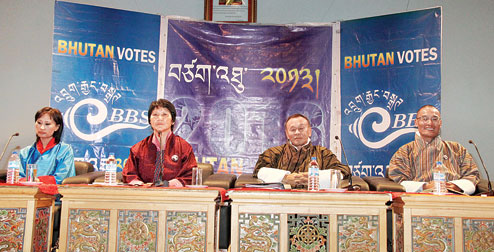 |
| Presidents of the four political parties contesting the elections |
Continued from Page 11
What’s more important, though, is that New Delhi has always maintained a close relationship with the Bhutanese monarchy.
Diplomatic sources stress that India, which has been supporting Bhutan’s five-year plans since 1961 and has borne 23 per cent of its last plan between 2008 and 2013 at a cost of Rs 3,400 crore, wants a “stable and secure Bhutan”.
What it doesn’t want is the Himalayan nation to become a “playground” for China, its other neighbour. Thimphu has no diplomatic ties with Beijing although officials from both countries meet regularly to settle their border issues. India was a bit perturbed when Prime Minister Thinley met former Chinese premier Wen Jiabao on the sidelines of a UN conference in Brazil in June, 2012.
Good relations with a friendly government will help India’s domestic politics too. India does not want Bhutan to be a “sanctuary for militant groups such as the ULFA or the KLO”. Further, India is funding a number of hydro projects in Bhutan on the understanding that Thimphu will sell the excess power to India and help meet India’s energy requirements.
But while New Delhi keeps a watch on the polls, in Bhutan there is a sense of disquiet. Sections of people believe that democracy has to be strengthened — especially when it comes to the media, which the ruling establishment is sometimes accused of trying to muzzle.
“We have exposed several official misdeeds as well as political and bureaucratic corruption in Bhutan over the last few years, incurring the wrath of the government,” says Tenzing Lamsang, editor of The Bhutanese, an investigative paper. He says government advertisements were drastically slashed from Nu 10 lakh a month to Nu 3 lakh in April 2012, forcing the paper to cut its staff and expenditure by 50 per cent.
The Opposition parties promise a change if they come to power. “We would like to empower the people and ensure their liberty. We want to see that the centralised power structure goes from the hands of a few ministers to the people,” says Tashi Dorji, a media advisor to the PDP.
Educationist Thubten Gyatsho has no time for party squabbles or election promises. The director of Paro College of Education believes what’s important is that democracy has finally given the people of Bhutan a chance to be heard by government. “And they should make full use of that,” he says.
He adds a word of caution, though. “Let Bhutan jog its way to democracy. Let us not sprint at this stage so that we don’t trip over.”










